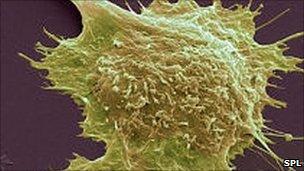Bowel cancer screening 'does cut deaths'
- Published

About 16,000 people a year die of bowel cancer in the UK
A bowel cancer screening programme in England is on course to cut deaths by a sixth, say researchers studying results from the first million people tested.
However, the work, published in the journal Gut, has raised concerns that the programme, launched in 2006, misses tumours in certain parts of the colon.
Testers checked a faeces sample for signs of abnormal bleeding.
The researcher who analysed the results said money should be spent on bringing in more sensitive tests.
Approximately 16,000 people a year die from bowel cancer, making it second only to lung cancer as a cause of death in the UK.
Part of the reason for the high mortality rate is that symptoms often do not appear until cancer is advanced and harder to treat.
The screening programme aims to catch the tumours earlier, meaning more patients can be cured.
Several million people aged 60 and over have now been screened, with approximately half of those invited taking part.
When results from the first 1.08 million taking part were collated, it was found that 2.5% of men and 1.5% of women had received an abnormal result, and were sent for further tests, usually colonoscopy, in which a tube with a camera on the end is passed into the colon.
Early stage cancers
Among the men with abnormal results, 43% turned out to have either cancer or pre-cancerous growths in their colon. The figure for women was 11.6%.
Most of these were early-stage cancers, which are generally easier to treat.
Professor Julietta Patnick, director of the NHS Cancer Screening Programmes, said she was "delighted" by the results.
"We are pleased to be on track to cut bowel cancer deaths by our target of 16% - early detection is crucial to lowering the number deaths from bowel cancer."
However, the test appeared to be less effective at spotting cancers in the upper section, or "right side" of the colon.
Cancer statistics from millions of people diagnosed with the disease suggest that for every three cancers in the left side of the colon, there will be one in the right side.
However, of the thousands of cancers found by the screening test, only 14% were on the right side.
Questions remain
Prof Richard Logan, of Nottingham University, who led the study, said it was not yet fully understood why cancers on the right-hand side were not showing up during screening.
Among the possibilities, he said, were that they grew faster, and were more likely to be diagnosed conventionally, or that they were less likely to bleed and trigger a positive test result.
However, he said that the current blood test was "old fashioned", and should be replaced by a more modern alternative which might be more sensitive.
He said: "There is a much better test available, but it will cost money to introduce it, and that money is not currently there."
A spokesman for the screening programme said that the move to the new test was being "actively considered", although no date had been set for a change.
Deborah Alsina, the chief executive of Bowel Cancer UK, welcomed the results, adding that separate moves to widen access to a form of colonoscopy called flexible sigmoidoscopy would also improve screening.
"As a higher proportion of cancers are being found in the left side of the bowel than predicted, the rollout of flexible sigmoidoscopy screening in the new year will help to save even more lives.
"However, this does need to be rolled out quickly with a sustained focus on areas with low uptake of screening."
- Published11 November 2011
- Published23 August 2011
- Published17 May 2011
- Published23 March 2011
- Published5 March 2011